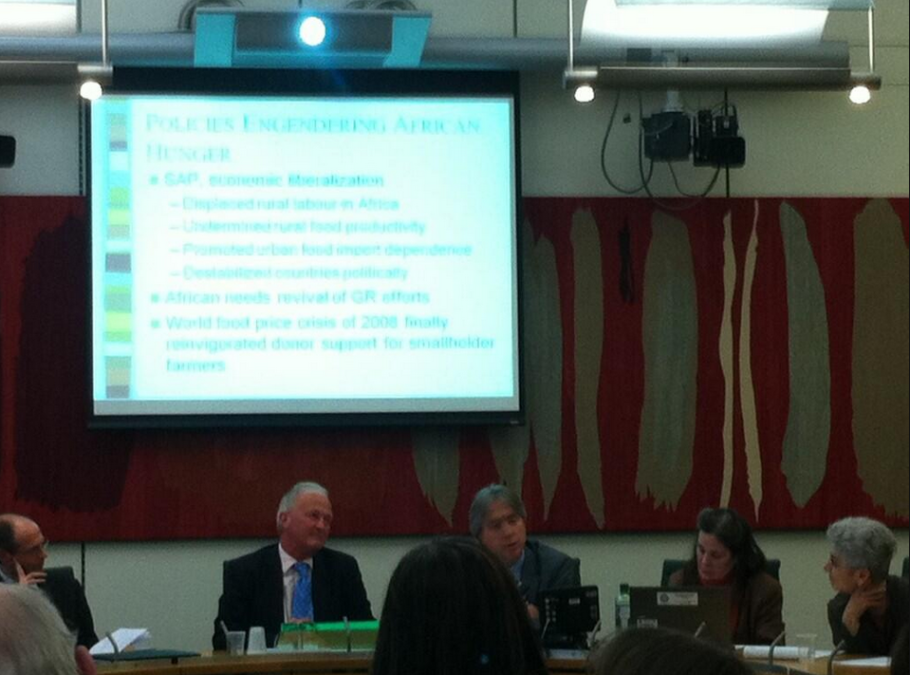If women were given equal access to resources it would boost the total agricultural output in developing countries by 4%, reducing the number of undernourished people in the world by 100 million. To celebrate International Women’s Day Farming First promoted the Female Face of Farming by attending key events and engaging in the dialogue connecting women with food security. Linking the role of women to food security is vital if the world is to produce more food for an ever-growing population.
All Party Parliamentary Group
On Wednesday 6 March, Farming First attended the All Party Parliamentary Group on ‘Limits to Gender Empowerment? Gender Perspectives on Agriculture and Health’ with key speakers including Robert Vos, Director of Gender, Equity and Rural Employment Division at the FAO.
Robert Vos highlighted one of the main inequalities and barriers for women in agriculture, stating: “women are producing our food but are still left out of decision making, they are not being represented at policy level and this must change.”
The panel also discussed the tools and seeds women use in agriculture and how these impact life for female farmers. Dr Deborah Bryceson, reader in the School of Geographical and Earth Sciences, University of Glasgow said: “women are the main users of the hoe, a low level technology that is increasingly restrained and an enormous absorber of manual power. However, it is a misconception to think that this is backward, women choose to use the hoe as it is a reliable tool that is easy to access and I think female farmers are likely to keep a firm grip on this method.”
Professor Jane Guyer, director of undergraduate studies at John Hopkins University, also commented on the use of seeds: “women, like other people in agriculture today, are willing to experiment with new types of seed that can help tackle climate change or increase yields on a farm.”
Deborah Bryceson stated that equality begins when women stop being treated as victims in agriculture: “women are central in food production and on International Women’s Day it is important not to think of them as weak or vulnerable as this neglects the past thirty years of history.”
Celebrate and Empower the Female Face of Farming
Farming First member Anette Friis addressed the gender gap in agriculture in a blog for the Huffington Post. Friis explored the many obstacles that prevent women from producing yields equal to men, and consequently effect the state of food security:
Addressing women’s rights, violence against women and moving towards greater equality is pertinent all over the world and spans across different areas of social, economic and political life. One area that is often overlooked and one where a great (if not one of the greatest) gender gaps persists — and where we are increasingly understanding the interlay and implications of violence against women — is in agriculture.”
Farmers, workers, entrepreneurs, care-givers, bread-winners, bread-makers, mothers, wives, daughters — women are at the heart of agriculture and will be at the heart of providing solutions to the world’s greatest challenges.”
To read the full blog click here
Commission on the Status of Women
This year is the 57th session of the UN’s Commission on the Status of Women, taking place from 4 – 15 March in New York. Key themes being discussed this year include:
- Eliminating and preventing violence towards women and girls
- The equal sharing in responsibility between women and men in the context of HIV
- Gender quality issues that will be reflected in the Post-2015 Sustainable Development Goals
I congratulate you from the bottom of my heart, all the world leaders need to realise our aspirations, your aspirations. We celebrate the steps being taken by women to ensure they are able to enjoy their fundamental human rights. Yet women are still often paid less than men, all too regularly their care giving work and work in the home goes unrecognised. Most troubling of all women are subjected to shocking attacks and abuse, often from those they should be able to trust.”
Ending violence against women and girls is a human rights issue, social issue and a development issue.”

